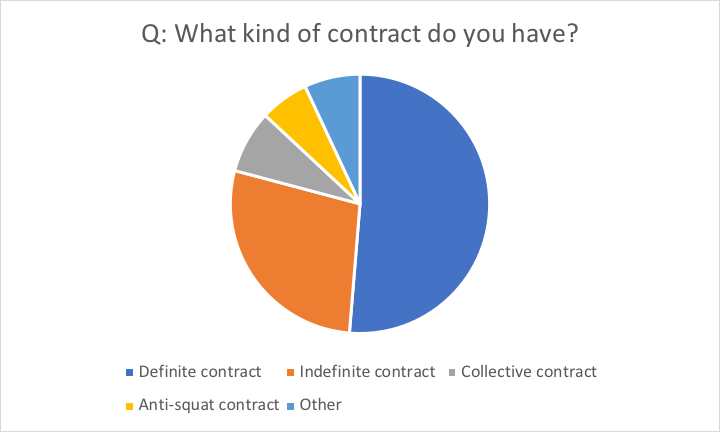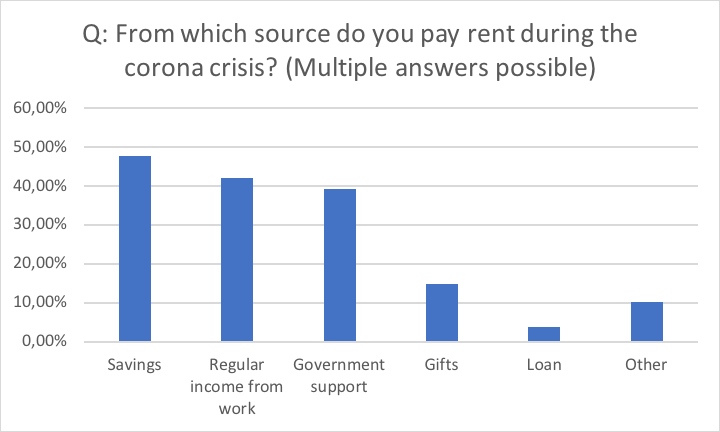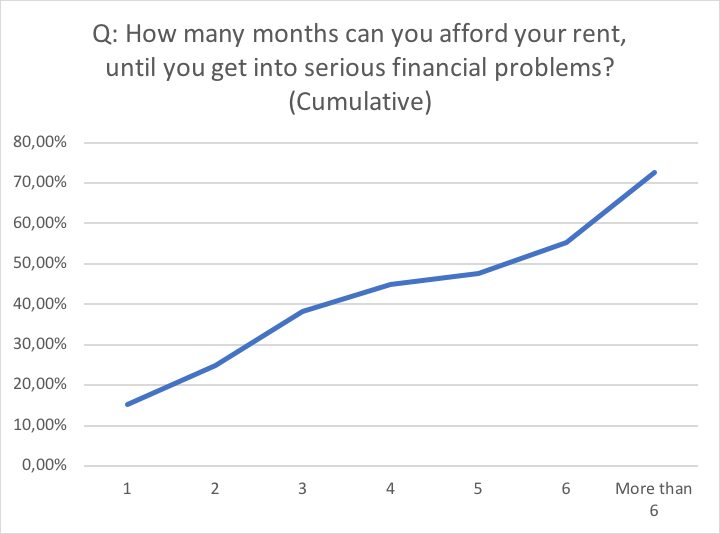How do the current Corona pandemic and economic crisis impact the renting situation of artists? For how long can artists afford to continue renting their studios without further support? Read the results of our recent survey here.
Since the outbreak of the Corona pandemic, there has been a surge of concerns among tenants, owners, and managers of studio spaces throughout the Netherlands.[1] These concerns appear to be reasonable: since the crisis has greatly reduced the income position of cultural workers[2], while fixed expenses, such as studio rent, remain the same, acute financial problems are likely to occur. However, little data is available to measure the impact of the Corona crisis on studio rent. How big are problems for tenants at this point exactly? Are they equally big in different regions? And how big will they be in six months from now? Are tenants (considering) leaving their studios?
To counter this data gap, Platform BK opened a survey on working and living spaces in times of Corona. Between the 25th of May and the 14th of June, 2020, 117 respondents filled out the survey. In this report, Platform BK presents its findings. Respectively, it provides a succinct overview of:
- the size and make-up of the group of respondents;
- the types of properties the respondents rent and the types of contracts they hold;
- rent problems encountered by tenants in times of corona;
- the general precarity of tenants, as shown by the survey data;
- the research and advocacy context of this survey.
Respondents
The majority of these people (64.96%) are visual artists. The rest is made up of a diverse group of photographers, film makers, producers, curators, writers/poets, graphic designers, cultural programmers, and researchers/critics.

The rented units of most respondents (63.79%) are located in the Amsterdam area. Smaller groups of respondents rent in (the vicinity of) Den Haag (6.90%), Utrecht (4.31%), Rotterdam (5.17%), Den Bosch, Arnhem, and other regions.

Most respondents (60.68%) rent studio units, while the second largest group (25.64%) rents combined studio and living units.

Ownership and contracts
Striking, though not surprising, is the large array of different categories of units: units in ‘broedplaatsen’, free sector units, IJzeren Voorraad, ‘anti-kraak’, self-organized spaces, and units via housing corporations all make up substantial components.

Ownership over the rented units is spread over municipalities, housing corporations, private owners, and collective owners. This diversity reflects the complexity of the systems and regulations of social real estate. It shows that it is hard to make any general analysis, yet, for exactly that reason, thorough research is desirable.

Just over a quarter (27.83%) of the respondents hold an indefinite renting contract. More than half of the respondents (58.26%) have a contract which can be one-sidedly terminated by the owner or manager of the property, either at a determined ending date or at an undetermined moment in the future.

Rent problems
On average, the respondents allocate 38% of their income to rent. This is significantly more than the maximum of 33% of monthly income that should, as suggested by the NIBUD, be allocated to rent by any household.[3] There might be a correlation between this high percentage and the fact that exactly half of the respondents (50.00%) state that they experience some financial difficulty in paying rent since the outbreak of the corona crisis.
The percentage of respondents who reached a compensation or relief agreement with their landlord (20.56%) is much lower than the 50% who have problems paying their rent. This suggests that a larger group of tenants will encounter the necessity to come to crisis arrangements within the next few months. This idea is supported by the facts that almost half of the respondents (47.66%) currently use savings to pay their rent, and that almost as many (44.76%) won’t be able to afford their rent if the situation remains unchanged for another four months. One out of four respondents (27.62%) will not get into financial troubles or is unable to say how soon.

Precarity
On average, the respondents deem their rented unit highly important (8.8/10) for the sustainability of their professional practice. Yet, almost half of the respondents (46.60%) experience the risk that their contract will be terminated during the corona crisis. More than a quarter of the respondents (28.57%) has already considered giving up their unit since the corona outbreak, and a small group (2.86%) has already given up their unit. These numbers show that the ‘worrisome income position of artists’[4] makes that the Corona pandemic is felt very directly and heavily in the field. It directly affects the affordability of studio space, and thereby possibly endangers the continuity of the rich and diverse cultural and artistic production in the Netherlands.

Context
Both the Survey on living and working spaces in times of Corona and this report were created by Platform BK. Another, simultaneous survey on the issues of studio rent during the Corona crisis was conducted by the Boekmanstichting – Kenniscentrum voor kunst- en cultuurbeleid. While this report mainly reflects the situation in Amsterdam, Boekmanstichting has reached more respondents in other cities, including Utrecht and Arnhem. For optimal overview, it is suggested to read both reports.
The insights in provided by this survey will be used by Platform BK to promote improvement of the living and renting situations of individual artists. In this, Platform BK collaborates with Kunstenbond, Broedplaatsen United Tenants (BUT!), and Bond Precaire Woonvormen.
References
[1] Roel Griffioen, ‘Het atelierbeleid in tijden van Corona: Zonder huurders geen broedplaatsen en zonder broedplaatsen geen huurders’, Metropolis M, 25 June 2020, http://www.metropolism.com/nl/features/41178_het_atelierbeleid_in_tijden_van_corona_zonder_huurders_geen_broedplaatsen_en_zonder_broedplaatsen_geen_huurders_berichten_uit_een_andere_wereld_11.
[2] This much has been shown in previous surveys, such as those of Kunstenbond and Platform BK. See, for instance, Platform BK, ‘Platform BK overziet de crisis en vraagt de minister om realisme’, Platform BK, 30 March 2020, https://www.platformbk.nl/platform-bk-overziet-de-crisis-en-vraagt-de-minister-om-realisme/.
[3] NIBUD, ‘Nibud luidt noodklok: kwart van de huurders zit financieel klem’, NIBUD, 13 September 2019, https://www.nibud.nl/beroepsmatig/nibud-luidt-noodklok-kwart-van-de-huurders-zit-financieel-klem/.
[4] SER and Raad voor Cultuur, ‘Passie gewaardeerd: Versterking van de arbeidsmarkt in de culturele en creatieve sector’, SER, April 2017, https://www.ser.nl/-/media/ser/downloads/adviezen/2017/passie-gewaardeerd.pdf.
Platform BK researches the role of art in society and takes action for a better art policy. We represent artists, curators, designers, critics and other cultural producers.